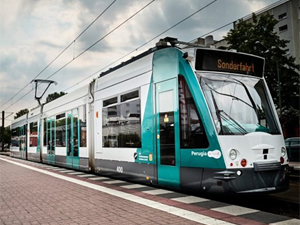



Date:25/09/18
 The world's first autonomous tram entered operation last week, albeit as part of an initial demonstration showcasing its AI-powered driving capabilities. Taking to the tracks in the east German city of Potsdam, the Siemens Combino tram successfully navigated through traffic as part of an international transport expo, pointing to a future where computer systems aboard these large, heavy vehicles can limit the risks posed to pedestrians and other road users in their path.
The world's first autonomous tram entered operation last week, albeit as part of an initial demonstration showcasing its AI-powered driving capabilities. Taking to the tracks in the east German city of Potsdam, the Siemens Combino tram successfully navigated through traffic as part of an international transport expo, pointing to a future where computer systems aboard these large, heavy vehicles can limit the risks posed to pedestrians and other road users in their path.
The Combino tram was developed by Siemens and features much of the same technology found in autonomous cars, with lidar, radar and camera sensors onboard to generate a picture of the traffic environment. The AI algorithms allow the tram to respond to trackside signals, autonomously respond to hazards in its path and make stops (though no passengers were picked up for the trial).
As part of InnoTrans 2018, a transport expo in nearby Berlin, the Combino tram was put to work on a 6-kilometer (3.7-mi) section of test track, departing from transport company ViP's depot and carrying out a loop through the city of Postdam. This included encounters with real traffic, with a human driver at the helm ready to intervene should need be.
According to Kate Connolly fromThe Guardian, who rode aboard the tram, this included a faux emergency where a Siemens employee wheeled a pram out onto a walkway in the vehicle's path. This successfully triggered the tram's sensors and in turn its brakes, bringing it safely to a stop. Once the pram was safely out of the way, the autonomous driving systems were fired up again by the human operator and it continued on its way.
With these initial trials now carried out without a hitch, ViP and Siemens are working with computer scientists at the University of Karlsruhe to further develop the systems and explore the potential of a wider rollout, including commercial use of an automated system for Potsdam.
"By making trains and infrastructure intelligent, we can guarantee availability and enhance safety in local and long-distance travel," said Sabrina Soussan, CEO of Siemens Mobility.
Germany launches world’s first autonomous tram in Potsdam
 The world's first autonomous tram entered operation last week, albeit as part of an initial demonstration showcasing its AI-powered driving capabilities. Taking to the tracks in the east German city of Potsdam, the Siemens Combino tram successfully navigated through traffic as part of an international transport expo, pointing to a future where computer systems aboard these large, heavy vehicles can limit the risks posed to pedestrians and other road users in their path.
The world's first autonomous tram entered operation last week, albeit as part of an initial demonstration showcasing its AI-powered driving capabilities. Taking to the tracks in the east German city of Potsdam, the Siemens Combino tram successfully navigated through traffic as part of an international transport expo, pointing to a future where computer systems aboard these large, heavy vehicles can limit the risks posed to pedestrians and other road users in their path.The Combino tram was developed by Siemens and features much of the same technology found in autonomous cars, with lidar, radar and camera sensors onboard to generate a picture of the traffic environment. The AI algorithms allow the tram to respond to trackside signals, autonomously respond to hazards in its path and make stops (though no passengers were picked up for the trial).
As part of InnoTrans 2018, a transport expo in nearby Berlin, the Combino tram was put to work on a 6-kilometer (3.7-mi) section of test track, departing from transport company ViP's depot and carrying out a loop through the city of Postdam. This included encounters with real traffic, with a human driver at the helm ready to intervene should need be.
According to Kate Connolly fromThe Guardian, who rode aboard the tram, this included a faux emergency where a Siemens employee wheeled a pram out onto a walkway in the vehicle's path. This successfully triggered the tram's sensors and in turn its brakes, bringing it safely to a stop. Once the pram was safely out of the way, the autonomous driving systems were fired up again by the human operator and it continued on its way.
With these initial trials now carried out without a hitch, ViP and Siemens are working with computer scientists at the University of Karlsruhe to further develop the systems and explore the potential of a wider rollout, including commercial use of an automated system for Potsdam.
"By making trains and infrastructure intelligent, we can guarantee availability and enhance safety in local and long-distance travel," said Sabrina Soussan, CEO of Siemens Mobility.
Views: 399
©ictnews.az. All rights reserved.Similar news
- Azerbaijani project to monitor disease via mobile phones
- Innovative educational system to be improved under presidential decree
- NTRC prolongs license of two TV and radio organizations for 6 years
- Azerbaijan establishes e-registry for medicines
- Azerbaijani museum introduces e-guide
- Nar Mobile opens “Nar Dunyasi” sales and service center in Siyazan city
- International conference on custom electronic services held in Baku
- OIC secretary general to attend COMSTECH meeting in Baku
- Azerbaijan develops earthquake warning system
- New law to regulate transition to digital broadcasting in Azerbaijan
- Azerbaijani State Social Protection Fund introduces electronic digital signature
- Intellectual traffic management system in Baku to be commissioned in December
- Tax Ministry of Azerbaijan started receiving video-addresses
- World Bank recommends Azerbaijan to speed up e-service introduction in real estate
- Azerbaijan to shift to electronic registration of real estate





















